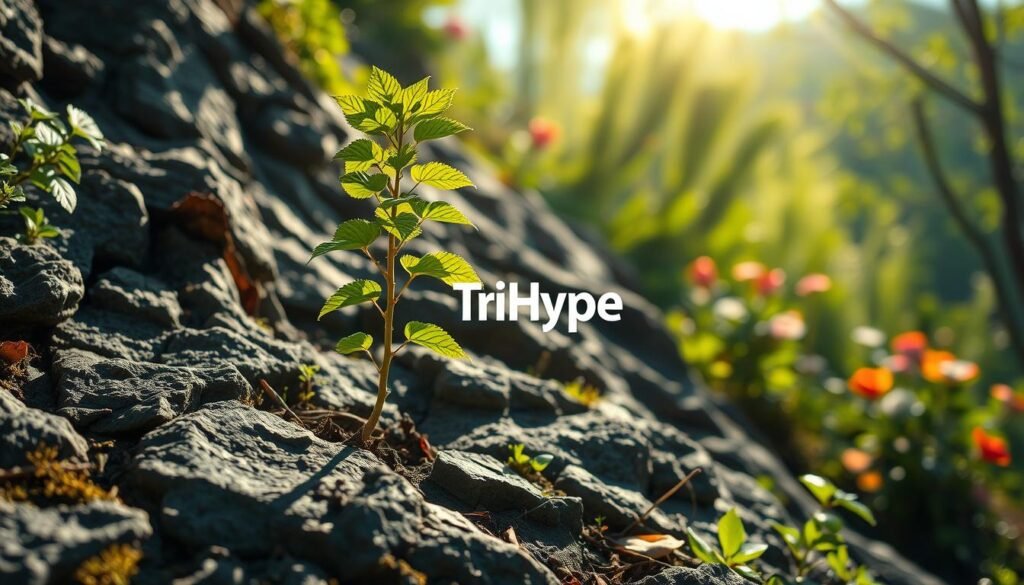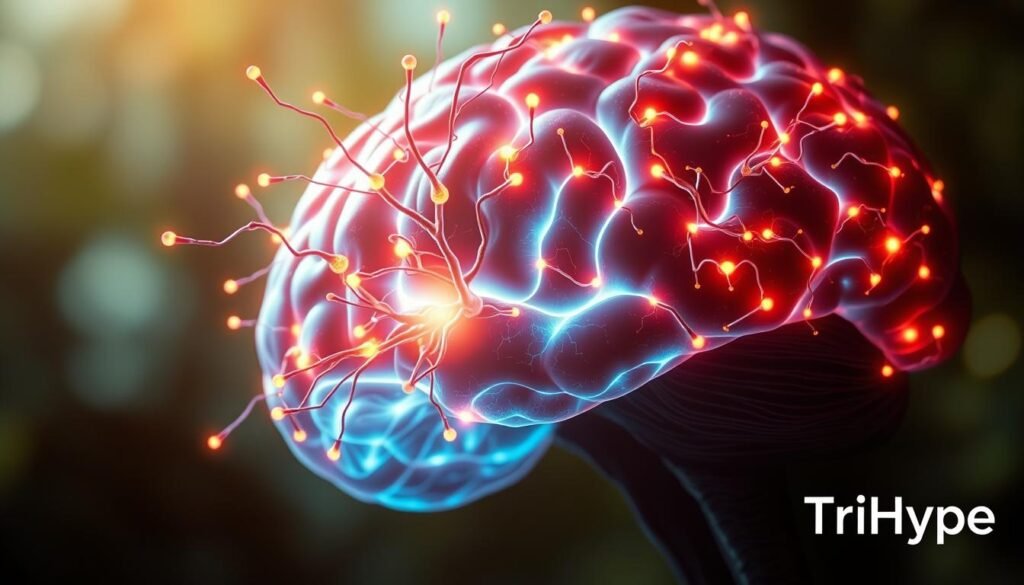Have you ever seen someone beat huge challenges and win big? Often, their success comes from their mindset. They believe in their abilities and think intelligence can grow. In this guide, we’ll dive into how a growth mindset can unlock your full potential and help you grow in life and work.
Imagine a young musician facing a tough piece of music. Instead of quitting, they see it as a chance to learn and get better. With hard work and a willingness to learn from mistakes, they master the music. This shows the power of a growth mindset – believing you can get better with effort and learning.
Key Takeaways
- Developing a growth mindset is the key to unlocking your true potential.
- A growth mindset is characterized by a belief in the malleability of intelligence and a focus on learning, effort, and resilience.
- Embracing challenges, valuing effort over talent, and continuously seeking new knowledge are hallmarks of a growth mindset.
- Neuroplasticity and the groundbreaking research of Carol Dweck provide the scientific foundation for the growth mindset.
- Practical strategies, such as fostering a culture of feedback and building mental toughness, can help cultivate a growth mindset.
In this journey, we’ll explore key strategies and insights. They’ll help you face challenges, keep going through tough times, and keep improving yourself. Get ready to unlock your true potential and change your life with a growth mindset.
What is a Growth Mindset?
A growth mindset is a belief that our abilities and talents can grow. This idea is championed by psychologist Carol Dweck. It’s different from a fixed mindset, where people think their qualities are unchangeable.
Understanding the Concept
Our brain is dynamic and can change, thanks to neuroplasticity. This means we can learn and grow over time. With a growth mindset, we see challenges as chances to get better, not threats to our self-worth.
Distinguishing from a Fixed Mindset
People with a fixed mindset think their talents are set forever. They might shy away from risks, fearing failure. On the other hand, those with a growth mindset see failures as part of learning. They’re ready to face new challenges, knowing they can grow and improve.
| Growth Mindset | Fixed Mindset |
|---|---|
| Believes abilities can be developed through effort and learning | Believes abilities are innate and cannot be changed |
| Embraces challenges and sees them as opportunities for growth | Avoids challenges and fears failure |
| Persists in the face of obstacles and sees mistakes as learning experiences | Gives up easily and sees mistakes as reflections of their inherent abilities |
| Seeks feedback and constructive criticism to improve | Rejects feedback and criticism, seeing them as threats to their self-image |
Knowing the difference between growth and fixed mindsets can unlock our potential. It starts a journey of learning and self-improvement.

The Importance of Embracing Challenges
Embracing challenges is key to growth. Instead of avoiding hard times, those with a growth mindset see them as chances to learn and get better. This mindset helps us build skills, knowledge, and determination to face and beat challenges.
By facing challenges, we open up to new experiences and views. This can greatly expand our understanding and lead to deep personal growth. Challenges make us step out of our comfort zones, helping us grow stronger and more resilient.
Overcoming obstacles with a growth mindset also brings pride and a sense of achievement. As we tackle and conquer difficulties, we grow more confident in our abilities. We also learn to appreciate the journey of learning and growing.
“The greatest glory in living lies not in never falling, but in rising every time we fall.” – Nelson Mandela
By adopting a mindset that embraces challenges, we can reach our full potential and grow personally. This approach to life’s hurdles not only helps us overcome obstacles but also builds the resilience needed for lasting success and happiness.

| Benefits of Embracing Challenges | Drawbacks of Avoiding Challenges |
|---|---|
| Develops problem-solving skills | Limits personal growth and learning |
| Builds resilience and perseverance | Reinforces a fixed mindset |
| Fosters a sense of accomplishment | Stunts development of new skills |
| Expands knowledge and perspective | Increases fear and anxiety about change |
Developing a Growth Mindset
Embracing a growth mindset is a journey that unlocks our true potential. It’s based on the belief that our abilities and talents can grow with effort and learning. This mindset sees our skills as something we can improve over time.
Cultivating Perseverance
Building a growth mindset means we must be persistent. When we face challenges, we see them as chances to grow. This persistence helps us develop resilience and problem-solving skills.
Valuing Effort over Talent
A growth mindset changes how we see talent and effort. It tells us that success comes from hard work, not just natural ability. This way, we learn to value the journey of growth, leading to lasting achievements.
| Growth Mindset | Fixed Mindset |
|---|---|
| Sees challenges as opportunities for growth | Avoids challenges to protect their ego |
| Believes effort and hard work lead to success | Believes talent and intelligence are fixed |
| Embraces feedback and criticism as a path to improvement | Sees feedback and criticism as a threat to their abilities |
| Celebrates the progress and success of others | Feels threatened by the success of others |
By adopting a growth mindset, we start a journey of continuous growth. Every challenge is a chance to improve. This mindset unlocks our potential and leads to great success in work and studies.

Continuous Learning: A Pathway to Growth
Having a growth mindset means always learning. By looking for new knowledge and skills, we can reach our full potential. This way, we can keep up with the fast pace of today’s world.
Learning for life helps us grow and find new chances for personal and work growth.
Seeking New Knowledge
Curiosity drives a growth mindset. When we’re eager to learn, we find new info and question what we know. This opens our eyes to the world and prepares us for big challenges.
Embracing Lifelong Learning
Learning isn’t just for school or a certain time. It’s a journey we take all our lives. By choosing to learn forever, we show we’re ready to change and stay current. This helps us grow personally and professionally.
Learning never stops in a growth mindset. It lets us reach our best, handle change, and aim for a better future. By always seeking new knowledge, we tap into the power of growth.

“The more that you read, the more things you will know. The more that you learn, the more places you’ll go.” – Dr. Seuss
The Power of Constructive Feedback
People with a growth mindset know how valuable constructive feedback is. They don’t see it as a threat but as a chance to grow. They look for ways to get better and keep improving.
By seeking and using feedback, we learn a lot and get better at what we do. Constructive feedback helps us grow and reach our goals. It helps us overcome challenges and reach our full potential.
“Feedback is the breakfast of champions.” – Ken Blanchard
Being open to feedback helps us get the most out of it. We need to look at our strengths and weaknesses. Then, we should work on improving where we need to.
Those who have a growth mindset value constructive feedback. They keep learning and growing from it. This helps them move forward in their lives and work.

The journey to growth and self-improvement starts with a desire to learn. By accepting and using feedback, we can achieve great things. We can unlock our full potential and do amazing things.
Building Resilience Through a Growth Mindset
Having a growth mindset helps us become more resilient and mentally tough. It lets us see challenges as chances to learn and get better, not as failures. This way, we can handle tough times and keep moving forward.
Overcoming Setbacks
A growth mindset makes us optimistic and determined when facing obstacles. We see failures as opportunities to learn and grow, not as limits. This mindset helps us bounce back from setbacks and stay on track.
Developing Mental Toughness
Embracing a growth mindset also builds mental toughness. It helps us manage stress, control our emotions, and keep going even when it’s hard. This mental strength lets us solve big problems, deal with disappointments, and stay focused on our goals.
By adopting a growth mindset, we can develop the resilience and mental toughness needed to face life’s challenges. We become more determined and committed to our personal growth and perseverance.
Neuroplasticity and the Growth Mindset
Neuroplasticity is at the core of the growth mindset. It shows how our brains can change and adapt with new experiences. This idea helps us see challenges as chances to grow and learn.
Having a growth mindset means we’re always learning and trying new things. This keeps our brains flexible and open to growth. It’s about seeing obstacles as chances to get better.
| Neuroplasticity | Growth Mindset |
|---|---|
| The brain’s ability to change and adapt in response to new experiences and learning | A belief that one’s abilities and intelligence can be developed through effort, dedication, and a willingness to embrace challenges |
| Allows for the formation of new neural connections and the strengthening of existing ones | Encourages individuals to view challenges as opportunities for growth and improvement |
| Enables lifelong brain development and cognitive enhancement | Fosters a passion for continuous learning and a resilient approach to setbacks |
Understanding neuroplasticity and the growth mindset opens doors to personal and professional growth. It helps us face the world’s changes with confidence and a drive to improve ourselves.

Carol Dweck’s Groundbreaking Research
Psychologist Carol Dweck has changed how we see the growth mindset. Her research shows how our beliefs about intelligence and abilities affect our motivation and success. This has made a big difference in how we learn and grow.
Dweck’s groundbreaking mindset theory has inspired many to think differently. She found that people with a fixed mindset see their abilities as unchangeable. On the other hand, those with a growth mindset believe they can improve their skills with effort and dedication.
| Mindset Type | Key Characteristics |
|---|---|
| Fixed Mindset | Believes intelligence and abilities are static, avoids challenges, gives up easily, sees effort as a sign of weakness |
| Growth Mindset | Believes intelligence and abilities can be developed through hard work and dedication, embraces challenges, sees effort as a path to mastery |
Dweck’s research shows that a growth mindset leads to more success. People with this mindset are more resilient and persistent. They are ready to face new challenges. This mindset helps us reach our full potential and improve ourselves.
“Individuals who believe their talents can be developed (through hard work, good strategies, and input from others) have a growth mindset. They tend to achieve more than those with a more fixed mindset (those who believe their talents are set in stone).”
Dweck’s work has greatly influenced education, psychology, and personal development. Her ideas have changed how we view learning and personal growth. By adopting a growth mindset, we can unlock our true potential and succeed in all areas of life.
Practical Strategies for Fostering a Growth Mindset
Building a growth mindset is a journey of self-improvement. We’ve gathered practical strategies to help you start this journey. These strategies will empower you to think in a growth-oriented way.
Embracing challenges is key to a growth mindset. Instead of avoiding obstacles, see them as chances to grow and learn. Be curious and resilient, and view failures as steps to success.
Getting constructive feedback is also crucial. Look for feedback from people you trust. See it as a way to improve yourself, not as a personal attack. This helps you learn and grow.
Having a growth mindset means always learning. Stay open to new knowledge and experiences. See every challenge as a chance to grow and explore.
Lastly, build resilience and mental toughness. You will face setbacks, but a growth mindset helps you overcome them. Learn to bounce back and stay strong through tough times.
By using these strategies, you’ll be on your way to reaching your full potential. You’ll adopt a growth mindset that helps you achieve your goals.
“The best way to predict the future is to create it.” – Peter Drucker
The Benefits of Developing a Growth Mindset
Having a growth mindset opens up many personal and professional doors. It lets people believe they can learn and grow with effort and hard work. This mindset boosts resilience, adaptability, and empowerment.
Personal Growth
A growth mindset helps you know yourself better and be ready for challenges. Instead of avoiding problems, you see them as chances to learn and get better. This mindset makes you more positive, boosts your self-esteem, and lets you try new things and grow personally.
Professional Success
In work, a growth mindset can really help you succeed. People with this mindset are more productive, solve problems better, and handle work changes well. It can lead to better career growth, more job happiness, and success in today’s fast-changing work world.
| Benefits of a Growth Mindset | Personal Growth | Professional Success |
|---|---|---|
| Resilience | Increased self-esteem | Improved productivity |
| Adaptability | Willingness to embrace challenges | Enhanced problem-solving skills |
| Empowerment | Positive attitude | Ability to navigate change |
By growing your mindset, you can get many benefits for your personal and work life. It helps you improve yourself and succeed more.
“The power of ‘yet’ is the foundation of the growth mindset. Believing you can develop your abilities.”
Overcoming Obstacles with a Growth Mindset
When we face challenges, how we approach them matters a lot. Having a growth mindset helps us see obstacles as chances to learn and grow. It’s not just about overcoming them, but also about learning from them.
A growth mindset helps us build resilience and problem-solving skills. It makes us determined to find solutions and learn from our experiences. This mindset stops us from getting frustrated or giving up.
With a growth mindset, we can reach our goals. Resilience becomes key as we see setbacks as chances to grow, not as obstacles to success.
- See challenges as chances to learn and grow.
- Be proactive in solving problems.
- Keep pushing forward with persistence and grit.
- Use feedback to improve.
- Keep learning and expanding your skills.
| Obstacle | Growth Mindset Approach | Outcome |
|---|---|---|
| Failing a difficult exam | Analyze what went wrong, change your study plan, and try again. | Do better next time and understand the subject better. |
| Experiencing a setback in a career transition | Learn from it, get feedback, and make a plan to move forward. | Grow stronger and make a successful career change. |
| Struggling to learn a new skill | Enjoy the learning, break it down, and celebrate your progress. | Master the skill and feel a sense of personal growth. |
By choosing a growth mindset, we can tackle any obstacle. This mindset unlocks our potential, builds resilience, and gives us the skills to achieve our goals.
“The future belongs to those who believe in the beauty of their dreams.”
– Eleanor Roosevelt
Cultivating a Growth Mindset in Children
Teaching children to have a growth mindset is key for their success and happiness. As parents, teachers, and mentors, we can guide the next generation. We can help them grow and achieve throughout their lives.
We can create an environment where kids feel encouraged to face challenges. They should value hard work more than natural talent. And, they should see mistakes as chances to learn and grow.
One good way is to praise their effort, not just their results. This shows them success comes from hard work and persistence. Encouraging them to try new things, even if it’s hard, helps them develop a growth mindset.
Also, showing them our own growth mindset can inspire them. Talking about our own challenges and learning experiences is powerful. By celebrating their efforts and progress, we create a positive learning environment.
“The journey of a thousand miles begins with one step.” – Lao Tzu
Teaching children to have a growth mindset is a great investment in their future. It gives them the tools to face challenges, learn from failures, and keep growing. This way, we help them reach their full potential and live a fulfilling life.
| Trait | Fixed Mindset | Growth Mindset |
|---|---|---|
| Approach to Challenges | Avoids challenges, gives up easily | Embraces challenges, perseveres |
| View of Effort | Sees effort as a sign of weakness | Believes effort is key to mastery |
| Response to Feedback | Defensive, takes feedback personally | Sees feedback as an opportunity to learn |
| Attitude Towards Mistakes | Tries to hide or downplay mistakes | Learns from mistakes, views them as part of the process |
Overcoming Self-Limiting Beliefs: Unlock Your Potential
Conclusion
Developing a growth mindset is a journey that changes us. It unlocks our true potential and leads to growth in many areas. By facing challenges, staying persistent, and always learning, we can grow beyond our limits.
This mindset is a lifelong journey. By using the strategies from this article, we can improve ourselves and find new opportunities. A growth mindset helps us overcome obstacles, grow personally, and succeed professionally. It lets us reach our full potential and change our lives for the better.
The power of a growth mindset is huge. It changes how we believe, behave, and achieve. It makes us resilient and adaptable, ready to face challenges and learn. Remember, a growth mindset is not just a goal but a way of life. It leads to fulfillment, purpose, and success.
